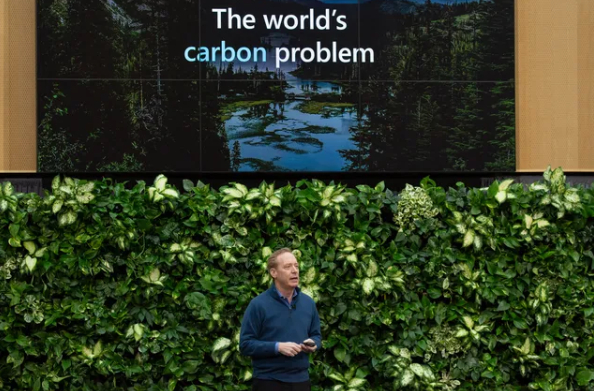May 21, 2025 | 08:41 GMT +7
May 21, 2025 | 08:41 GMT +7
Hotline: 0913.378.918
May 21, 2025 | 08:41 GMT +7
Hotline: 0913.378.918

Brad Smith, president of Microsoft, speaks during a climate initiative event at the Microsoft campus in Redmond, Washington, on Thursday, January 16th, 2020. Photo: Getty Images.
Microsoft is doubling down on a controversial plan to capture carbon dioxide emissions from wood-burning power plants. It announced a contract with energy company Stockholm Exergi to capture 3.33 million metric tons of carbon emissions from a biomass power plant in the Swedish capital in what is potentially the biggest deal of its kind to date - equivalent to taking more than 790,000 gas-powered cars off the road for a year.
It’s supposed to help Microsoft meet its goal of capturing more planet-heating carbon dioxide than it produces as a company by 2030 and then removing as much CO2 from the atmosphere as it has ever emitted since its founding by 2050.
But the jury is still out on whether wood-burning power plants actually help fight climate change or make things worse. Prominent environmental groups including the Center for Biological Diversity and Friends of the Earth International have criticized the strategy as a “false solution.” And back in 2018, nearly 800 scientists signed a letter to the European Parliament asking it to stop supporting the use of wood for bioenergy.
Exergi runs a power plant in Stockholm that runs on wood pellets and residue from forestry waste, also known as forest biomass. Since that fuel comes from trees that can theoretically regrow to capture as much carbon dioxide as the power plant releases by burning wood, proponents see it as a carbon-neutral source of energy. The European Commission actually considers biomass burning its largest source of renewable energy, even though it’s been tied to deforestation across Europe and the US.
Microsoft and Stockholm Exergi are taking that idea one step further by adding machinery to the power plant that’s supposed to capture a majority of its carbon dioxide emissions before it can escape into the atmosphere. By doing so, they believe they can achieve negative emissions - taking more CO2 out of the atmosphere than this source of energy produces. Negative emissions technologies like this have become popular with companies trying to offset the environmental impact of their carbon pollution.
But a growing body of research suggests the math doesn’t quite add up for bioenergy with carbon capture (BECCS). Devices that scrub CO2 out of smokestack emissions aren’t able to capture 100 percent of the carbon dioxide. And then there are additional emissions from clearing forests and transporting wood to be used as fuel. With that in mind, several studies have found that BECCS isn’t carbon negative after all and actually adds greenhouse gas pollution to the atmosphere.
Microsoft declined to respond to The Verge’s request for comment. It also didn’t clarify how much it would spend on the deal with Stockholm Exergi. But Microsoft has heard these concerns before. It signed another deal last year with Danish energy company Ørsted to capture 2.76 million metric tons of carbon dioxide from a wood-burning power plant in Denmark.
In Stockholm, construction of the carbon capture equipment at the power plant isn’t slated to start until next year — if Stockholm Exergi secures enough additional funding from other deals and government aid. Then, it would take 10 years to draw down all 3.33 million metric tons of carbon dioxide agreed to in the contract.
Stockholm Exergi sees this deal as a big stamp of approval for its carbon capture technology. “It is the strongest possible recognition of the significance, quality and sustainability of our project,” Stockholm Exergi CEO Anders Egelrud said in a press release.
(The Verge)

(VAN) Attempts to bring down the price of the Japanese staple have had little effect amid a cost-of-living crisis.

(VAN) Fourth most important food crop in peril as Latin America and Caribbean suffer from slow-onset climate disaster.

(VAN) Shifting market dynamics and the noise around new legislation has propelled Trouw Nutrition’s research around early life nutrition in poultry. Today, it continues to be a key area of research.

(VAN) India is concerned about its food security and the livelihoods of its farmers if more US food imports are allowed.

(VAN) FAO's Director-General emphasises the need to work together to transform agrifood systems.

(VAN) Europe is facing its worst outbreak of foot-and-mouth since the start of the century.

(VAN) The central authorities, in early April, released a 10-year plan for rural vitalization.